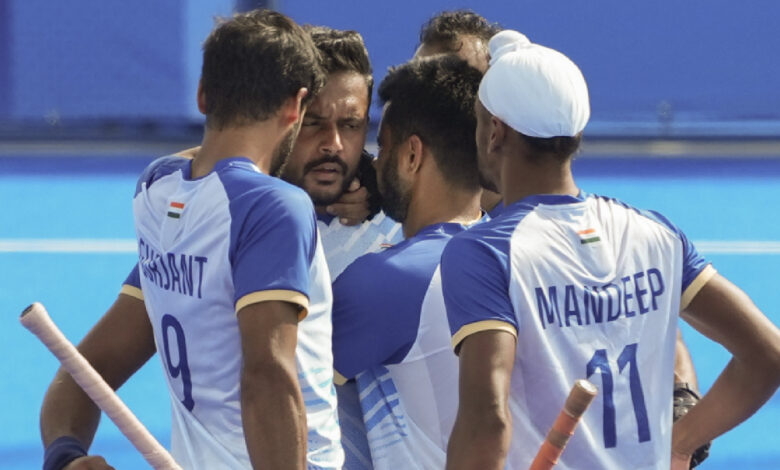Can Indian hockey’s mantra – ‘defend to win’ – empower them to defeat Germany after heroics against Great Britain and Australia? | Hockey News

The Indian men’s hockey team’s defeat in the penultimate game of their group against Belgium was, perhaps, the first sign. The reigning champions were pushed Harmanpreet Singh’s men all the way. If not for a streaky goal conceded, or if not for a stunning save the man at the post in the dying minutes off a Harmanpreet drag flick, India could have drawn. The performance, divorced from the result, was encouraging after a not-so-impressive start in the first three matches.
India’s head coach Craig Fulton, in his interactions with the media, has come across as pragmatic, and firm in his beliefs that the process matters more than the results. It might be cliched but it’s consent with him. “I think philosophy-wise I’d like to defend to win,” he had said in his first press conference. “I’d like to have our defensive structures in place because that’s the first step of attacking. If we try to play a counter-attacking style it doesn’t help if you can’t defend, so you would never win the ball back to counter attack.”
Defend to win, indeed. That is what India had to do for a large part of the quarterfinal against Great Britain as they pulled off a stunning backs-to-the-wall performance after playing with 10 men for 42 minutes in regulation time.
Mandeep Singh (L) with head coach Craig Fulton – File photo Hockey India.
Indian defence had not exactly been squeaky clean under Fulton in the Pro League and the tour of Australia, with a goal-conceding make always evidently around the corner, but on the flip side, the signs were also there. Despite losing 0-5 against Australia recently, they were hardly ever outplayed in four out of the five matches. The deep defence was regularly good in dealing with waves of attacking pressure from the likes of the Kookaburras as well as Belgium and Netherlands in the Pro League.
And all those culminated brilliantly in the win against GB that seemed utterly improbable when a red card was shown to Amit Rohidas. It wasn’t PR Sreejesh – who was superhuman at times between the posts – but a collective defensive rearguard.
The question now, however, is how will India approach Germany in the semifinal?
“We’ve got two ways of playing. We always have the high presses in the DNA of the Indian men’s team, but the half-court and playing a little deeper is something we need to get really confident with,” the coach had said last year. That’s the adaptability that would have to come to the fore against a German side which would be raring to avenge the bronze medal match loss in Tokyo that saw them return heartbroken and empty-handed.
Amit Rohidas of India in action with William Calnan of Britain and Zach Wallace of Britain. (Reuters)
Some of India’s attacking hockey against Australia in the famous win a few days ago was breathtaking. But with Rohidas suspended for the semifinal and India having only 15 players on the matchday squad (instead of the regular 16), Fulton might have to dip back into that well of pragmatism. Of course, India can’t afford to be as defensive as they were against GB, but Germany will be more enterprising in their attacking game than the Brits were. There will be more diagonal passing, there will be a few decisive aerials, and there will be a lot of pace.
Rohidas’ absence also means India will be without one of the best first-rushers in the world when it comes to defending penalty corners. Indian defenders will have to be extra careful in conceding too many PCs, something which was a concern against Ireland, for instance. Manpreet Singh is also a world-class rusher, but India would be better off in not tempting fate. The former captain would also have to slot back in defence much more to cover for Rohidas in open-play situations.
Once again, though, these are the situations that Fulton had prepared his side for. Manpreet frequently played defence during the Pro League, while Fulton also has on occasion said how he wants his side to get used to playing with a man short, be prepared for all eventualities.
In the Idea Exchange with The Indian Express recently, he was asked about the expectations that come on the back of Tokyo bronze as the team was preparing for Paris. “Realically, every time we play in a competition, we want to win. That’s my philosophy,” he had said. “But there’s also a realic goal and an ideal goal. The ideal goal is to win gold in every tournament we play. Realically, it’s where you are ranked now, and how you are performing.”
Having led India to the Asian Games gold shortly after taking over, Fulton achieved his first goal of overseeing a dominant Asian Games performance. Coming into Paris, he wasn’t hyping India’s chances, he knew it would be tough, given the path to the podium. But even the usually stoic South African couldn’t hide his emotions on the sidelines. India are ever so close to return to the podium, and they’d hope Fulton’s rooted philosophies can come to their aid once more.



